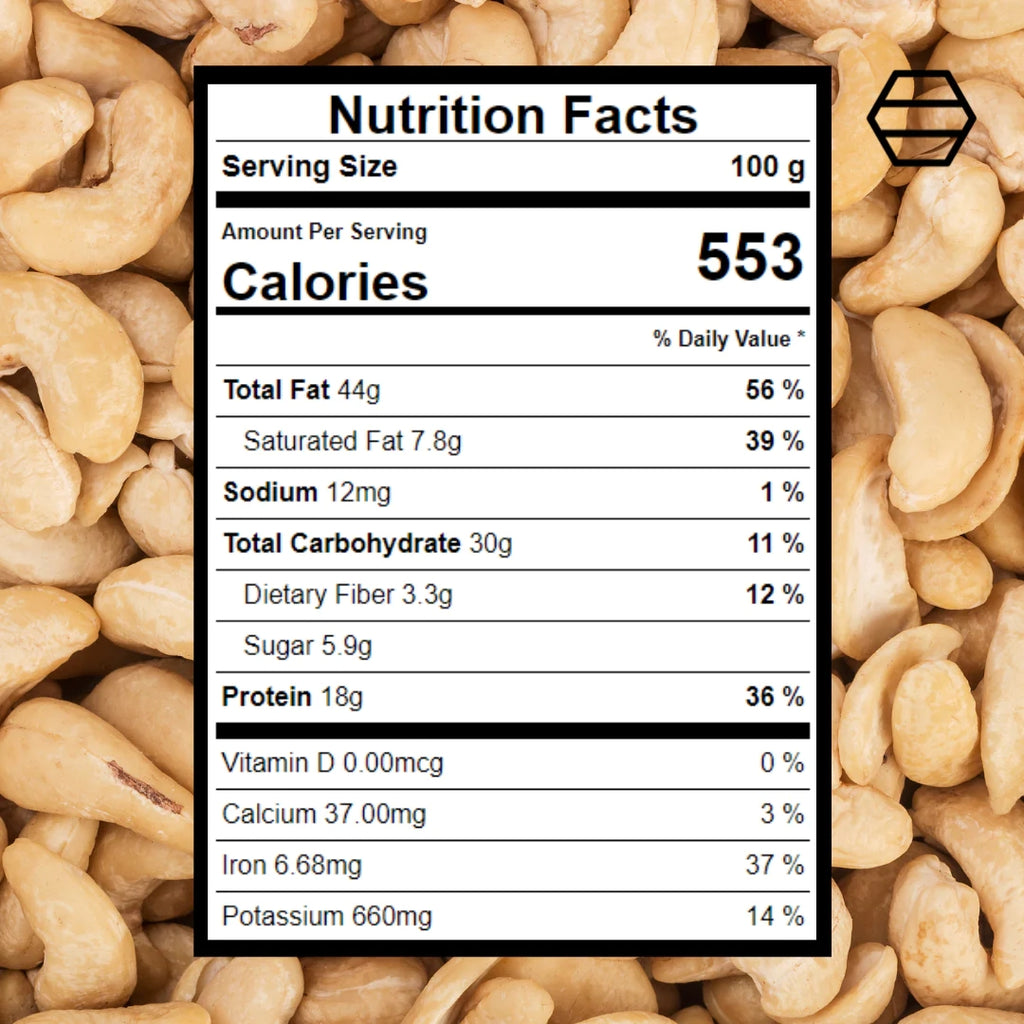# Type at least 1 character to search # Hit enter to search or ESC to close
Nutrition in roasted cashews
Search
-
-
The Role of Food ...
Aug 07, 2025 -
Is Cashew Good Fo...
Jul 29, 2025
Archive
- September 2025
- July 2025
- June 2025
- May 2025

Nutrition in roasted cashews
Roasted cashews are those delicious nuts that have undergone a toasty transformation. They are gently heated until they turn golden brown and become irresistibly crunchy. Think of them as regular cashews' more flavorful sibling!
The roasting process intensifies their natural nuttiness, making them a delectable snack. Whether you enjoy them straight out of the bag, sprinkle them on salads, or use them in your favorite recipes, roasted cashews are a delightful treat that adds a satisfying crunch to your day.
It is good to know the difference between raw and roasted cashews.
The Nutritional Value of Roasted Nuts
Roasted nuts are not only a delicious snack but also a powerhouse of essential nutrients. Packed with vitamins, minerals, healthy fats, and fiber, roasted cashews offer numerous health benefits. Let's delve into the nutrition profile of roasted cashews and explore their potential advantages for overall well-being.
Macronutrients
Roasted cashews are a rich source of macronutrients, providing a balance of carbohydrates, proteins, and fats. In a 1-ounce (28-gram) serving, roasted cashews typically contain approximately 157 calories, 9 grams of carbohydrates, 5 grams of protein, and 12 grams of fat. These macronutrients make cashews an energy-dense snack that can help keep you satiated between meals.
Healthy Fats in Roasted Cashews
One of the standout features of roasted cashews is their healthy fat content. The majority of the fat in cashews comes from monounsaturated and polyunsaturated fats, including omega-3 and omega-6 fatty acids. These fats play a crucial role in maintaining heart health, reducing inflammation, and supporting brain function. Regular consumption of roasted cashews, in moderation, can contribute to a healthy fat intake.
Micronutrients
In addition to macronutrients, roasted cashews are also abundant in micronutrients that are essential for various bodily functions. They are an excellent source of minerals like copper, magnesium, phosphorus, and manganese. Cashews also provide vitamins such as vitamin E, vitamin K, and some B vitamins, including thiamin and niacin. These micronutrients play vital roles in supporting bone health, nerve function, immune system function, and energy metabolism.
Fiber Content
Fiber is an important component of a healthy diet, and roasted cashews contain a decent amount of dietary fiber. Fiber aids in digestion, helps regulate blood sugar levels, and promotes a feeling of fullness. In a 1-ounce serving, roasted cashews offer about 1 gram of dietary fiber, which can contribute to your daily fiber intake and support a healthy digestive system.
Protein
Roasted cashews are a good source of protein, making them a valuable addition to your diet. In a 1-ounce (28-gram) serving, roasted cashews provide approximately 5 grams of protein. Including cashews in your meals or enjoying them as a snack can contribute to meeting your daily protein needs.
Antioxidants and Phytochemicals
Roasted cashews also contain a variety of antioxidants and phytochemicals, which have been linked to various health benefits. Cashews contain antioxidants like vitamin E, which can help combat free radicals and reduce inflammation. Additionally, they contain plant compounds like flavonoids and phenolic acids that have been associated with potential anti-cancer and heart-protective properties.
Cashews are beneficial for adults and kids alike. It is useful to know how to introduce cashews to children so that they can avail the health benefits since an early age.
© 2026 WWCashews. All Rights Reserved | 1-888-404-0472 | info@wwcashews.com





Leave a comment